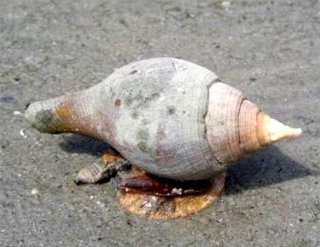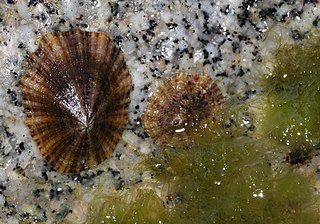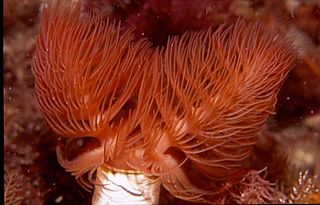
Friedrich Carl von Savigny was a German jurist and historian.

Marie Jules César Lelorgne de Savigny was a French zoologist and naturalist who served on Emperor Napoleon's Egypt expedition in 1798. He published descriptions of numerous taxa and was among the first to propose that the mouth-parts of insects are derived from the jointed legs of segmented arthropods.
Erpobdella obscura is a freshwater ribbon leech common in North America. It is a relatively large leech and is commonly used as bait by anglers for walleye and other sport fish. In Minnesota, live bait dealers annually harvest over 45,000 kg of bait-leeches, raising concerns of over-harvest.

Pachystyla is a genus of small air-breathing land snails, terrestrial pulmonate gastropod mollusks in the family Helicarionidae.

Giuseppe Saverio Poli was an Italian physicist, biologist and natural historian.

Pila is a genus of large freshwater snails with an operculum, African and Asian apple snails, aquatic gastropod mollusks in the family Ampullariidae, the apple snails.

Turbinella is a genus of very large sea snails with an operculum, marine gastropod mollusks in the subfamily Turbinellinae of the family Turbinellidae.

Stolidobranchia is an order of tunicates in the class Ascidiacea. The group includes both colonial and solitary animals. They are distinguished from other tunicates by the presence of folded pharyngeal baskets. This provides the etymology of their name: in ancient Greek, στολίς, ίδος means the "fold" of a cloth. Stolidobranchian sea squirts are also characterized by the complete absence of an abdomen. The abdominal organs of other tunicates are instead located to one side of the pharyngeal basket in this group.

Ficus is a genus of large sea snails, marine gastropod mollusks in the family Ficidae, the fig shells.

Patella caerulea, is a species of limpet in the family Patellidae. It is known by the common names Mediterranean limpet and rayed Mediterranean limpet. It is native to the Mediterranean Sea.

Erpobdella is a genus of leeches in the family Erpobdellidae. Members of the genus have three or four pairs of eyes, but never have true jaws, and are typically 20–50 millimetres (0.8–2.0 in) long. All members do not feed on blood, but instead are predators of small aquatic invertebrates, which they often swallow whole.

Lobularia is a genus of soft corals in the family Alcyoniidae.

Erpobdellidae is a family of leeches. It is one of the four families belonging to the suborder Erpobdelliformes of the proboscisless leeches order, Arhynchobdellida.

Protula bispiralis, commonly known as the red fanworm or as a mopworm, is a species of marine polychaete worm in the family Serpulidae.

Phyllodocidae is a family of polychaete worms. Worms in this family live on the seabed and may burrow under the sediment.

Neanthes fucata is a species of marine polychaete worm in the family Nereididae. It lives in association with a hermit crab such as Pagurus bernhardus. It occurs in the northeastern Atlantic Ocean, the North Sea and the Mediterranean Sea.

Haemopis is a genus of leeches belonging to the family Haemopidae. The species of this genus are found in Eurasia and Northern America.
Orbinia is a genus of polychaetes belonging to the family Orbiniidae.
Tubificinae is a subfamily of annelids belonging to the family Naididae.















